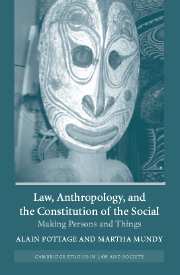Book contents
- Frontmatter
- Contents
- Notes on contributors
- 1 Introduction: the fabrication of persons and things
- 2 Res Religiosae: on the categories of religion and commerce in Roman law
- 3 Scientific objects and legal objectivity
- 4 Legal fabrications and the case of ‘cultural property’
- 5 Ownership or office? A debate in Islamic Hanafite jurisprudence over the nature of the military ‘fief’, from the Mamluks to the Ottomans
- 6 Gedik: a bundle of rights and obligations for Istanbul artisans and traders, 1750–1840
- 7 Losing (out on) intellectual resources
- 8 Re-visualising attachment: an anthropological perspective on persons and property forms
- 9 Our original inheritance
- Bibliography
- Index
5 - Ownership or office? A debate in Islamic Hanafite jurisprudence over the nature of the military ‘fief’, from the Mamluks to the Ottomans
Published online by Cambridge University Press: 12 July 2009
- Frontmatter
- Contents
- Notes on contributors
- 1 Introduction: the fabrication of persons and things
- 2 Res Religiosae: on the categories of religion and commerce in Roman law
- 3 Scientific objects and legal objectivity
- 4 Legal fabrications and the case of ‘cultural property’
- 5 Ownership or office? A debate in Islamic Hanafite jurisprudence over the nature of the military ‘fief’, from the Mamluks to the Ottomans
- 6 Gedik: a bundle of rights and obligations for Istanbul artisans and traders, 1750–1840
- 7 Losing (out on) intellectual resources
- 8 Re-visualising attachment: an anthropological perspective on persons and property forms
- 9 Our original inheritance
- Bibliography
- Index
Summary
INTRODUCTION
European legal and political theory has long debated the historical genealogy of its distinction between dominium/property and imperium/sovereignty. With roots in Roman law, the distinction has been described as blurred in medieval Europe; one author writes that dominium came ‘to denote both proprietary right and governmental authority’ by the twelth and thirteenth centuries. But from the fourteenth century onwards arguments were advanced to reinstate the distinction as central to law and political theory. In the course of these arguments a central problem emerged: the origin of property. The search for an ultimate origin means that from John of Paris and Ockham in the fourteenth century, through the Spanish scholastics of the sixteenth century to Grotius and John Locke in the seventeenth century, jurists and political theorists argued about an origin outside historical time in a state of nature or in an original delegation by God to Adam. The same topoi of argument were deployed from the seventeenth century to justify a truly extravagant construction of private property as the prior condition for political freedom. Thus by the eighteenth century, European legal and political thought had embraced a veritable ideology of property often far removed from the complex, relational character of property law itself. It was the political ideology of property which asserted the absolute division of owner/person from object/thing.
- Type
- Chapter
- Information
- Law, Anthropology, and the Constitution of the SocialMaking Persons and Things, pp. 142 - 165Publisher: Cambridge University PressPrint publication year: 2004
- 3
- Cited by

